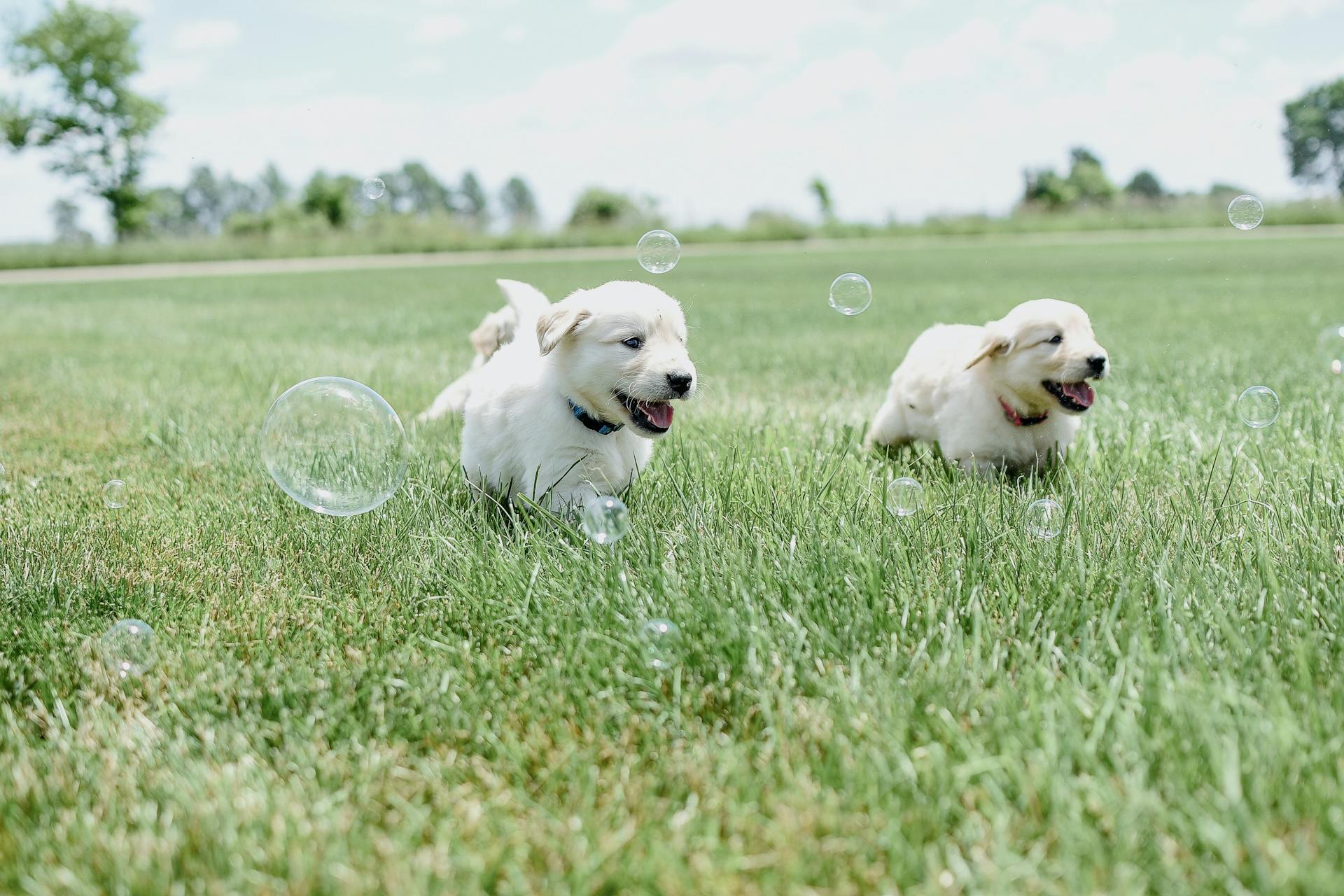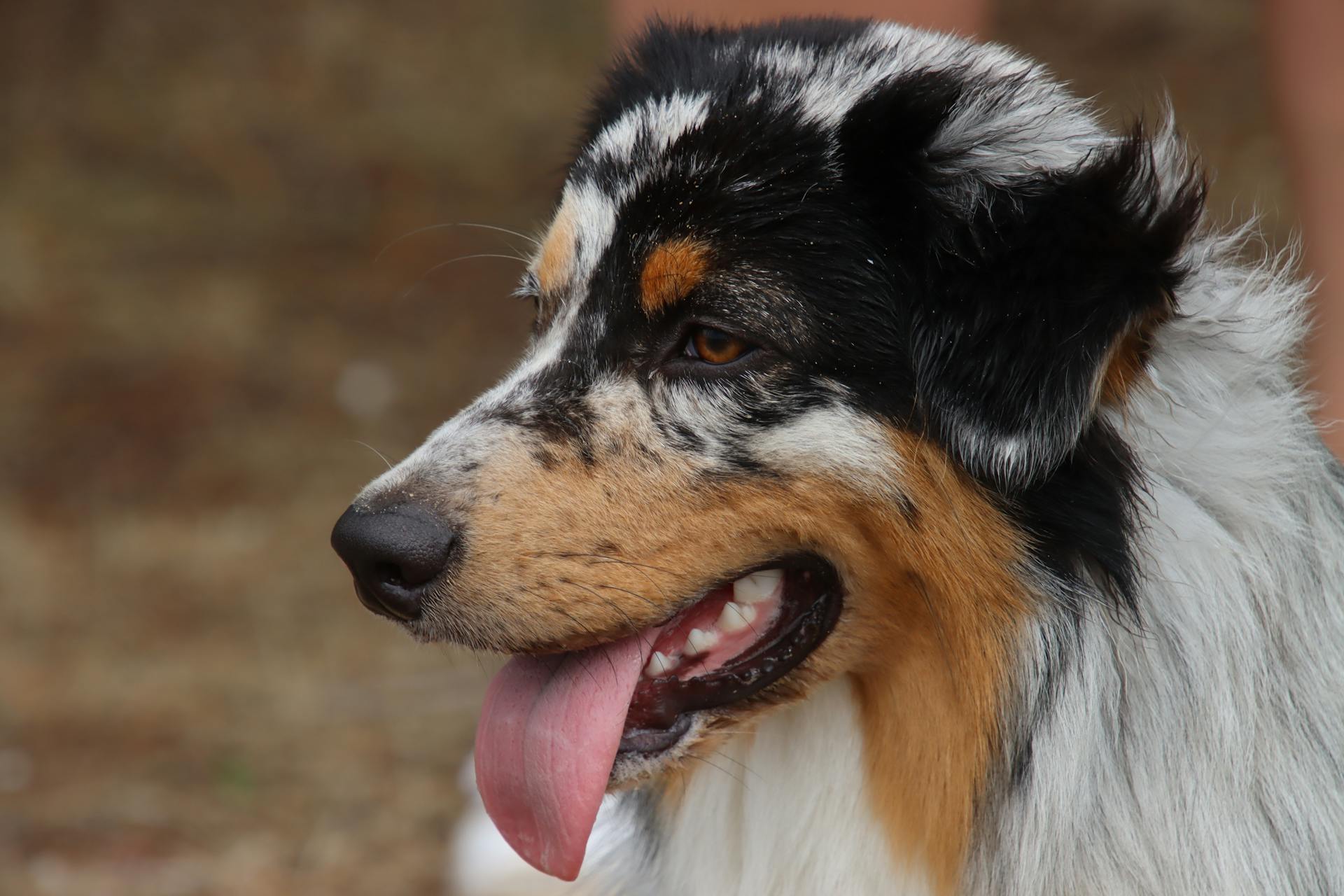
The Mini Aussiedoodle is a cross between an Australian Shepherd and a Miniature Poodle, making it a unique and lovable breed. This breed is often considered a hybrid or designer breed.
They typically weigh between 15-30 pounds and stand between 10-14 inches tall. Their intelligence and trainability make them a popular choice as family pets and working dogs.
Mini Aussiedoodles are known for their low-shedding coats, which require regular grooming to prevent matting and tangling. They are often described as friendly, outgoing, and affectionate, making them a great addition to many families.
Personality and Temperament
The Mini Aussiedoodle is a very sociable and loving dog that genuinely enjoys the relationship they develop with their owners. They become very attached to their families and make excellent family dogs.
They are very playful and active, requiring daily walks and play sessions to keep them healthy. Miniature Australian Shepherds and Miniature Poodles are highly intelligent, loyal, and outgoing, so you can expect the same from your Mini Aussiedoodle.
Aussiedoodles are exceptionally sweet animals that are happy to be fast friends with everyone. They tend to be more keen on their immediate family and owners.
They are good choices for people with kids and can be easily taught to coexist with dogs if they aren’t already jumping at the nearest pooch. This is because they are highly intelligent and need ample stimulation to keep them from getting bored.
Aussiedoodles are generally friendly and loving dogs that, when well socialized, get along with other pets and children. They are extremely intelligent and need ample stimulation to keep them from getting bored.
They are happiest with a lot of social interaction and both physical and mental enrichment. Activities like rousing games of Frisbee and canine sports are great outlets to keep your Aussiedoodle engaged.
Because they are so intelligent, professional training is an essential investment. Active owners who want to participate in something with their dogs would be well-suited for this breed.
Good with Kids?
The mini aussiedoodle is a great pet for families with children, but it's essential to teach kids how to interact with them safely. They are generally great with kids and don't exhibit aggressive tendencies, especially when properly trained.
To ensure a harmonious household, it's crucial to devote time to play and exercise with your mini aussiedoodle. They need a lot of physical activity, which can be a great way to bond with your family.
If you're considering bringing a mini aussiedoodle into your family, be aware that they have a very energetic nature. This means smaller children should be monitored to prevent accidental injuries.
Proper socialization is key to a lifelong friendship between your mini aussiedoodle and your kids. If you socialize them together early on, they'll likely become the best of pals.
Owning a Dog
Owning a dog requires a significant commitment of time and resources.
The mini aussiedoodle breed has incredible motors, so they need daily exercise to prevent health issues.
If you don't plan to spend much time outside or have an irregular schedule, this breed may not be the best fit.
They need regular walks and playtime, which can be time-consuming and tiring, especially for first-time owners.
An aussiedoodle's grooming schedule can also be a challenge, requiring extra hours of attention and maintenance.
This breed may be expensive, especially if you're looking for a reputable breeder with healthy litters.
Their prices can skyrocket depending on specific color variations, so budget accordingly.
Owning a Dog
Owning a dog requires a significant commitment to their exercise and grooming needs.
Aussiedoodles, for example, have incredible motors and need daily playtime or regular walks to prevent health issues.
They also require regular grooming, which can be time-consuming and may not be suitable for everyone.
If you're a first-time owner, it's essential to do your research beforehand to ensure you can provide the necessary care and attention.
An aussiedoodle can be an expensive breed, especially if you're working with breeders who have a good reputation and a track record of raising healthy litters.
Be prepared to budget accordingly and consider the costs of regular exercise and grooming.
Certain color variations can also drive up the price of aussiedoodle puppies, making them even more expensive.
Rescue Groups
If you're considering bringing home an Aussiedoodle, you may be wondering how to find one in need of a forever home. Finding a breed-specific rescue for Aussiedoodles can be tough because they're a mixed breed.
However, you can try contacting Australian Shepherd or Poodle breed-specific rescues, as they often care for mixes. They may have Aussiedoodles in their care or know of one that's looking for a new home.
If you're looking for a rescue group specifically for Aussiedoodles, here are a few options to consider:
- Aussie And Me Animal Rescue
- Carolina Poodle Rescue
Pet Care
Exercise is crucial for a mini Aussiedoodle's health and happiness, so plan for at least an hour of physical activity and mental stimulation daily. This can include walks, playtime, and interactive toys.
Mini Aussiedoodles need regular ear checks after outside activities to prevent dirt and insects from accumulating. Their nails should be filed down every 1-2 months, depending on your home's flooring.
Brushing your mini Aussiedoodle's teeth is essential, especially if they're small, as they're more prone to dental and gum diseases. Your veterinarian can provide guidance on how to brush their teeth effectively.
Regular grooming is necessary for mini Aussiedoodles, with most needing to be brushed a few times a week. Their coats can be prone to matting, so regular brushing between grooming sessions is a must.
Food & Diet
Mini Aussiedoodles need high-quality dog food that matches their size, age, and activity level. This can vary depending on your dog's individual needs, so it's best to consult with your veterinarian for personalized recommendations.
They're prone to weight gain, so a regular eating schedule is crucial to prevent overfeeding. This means feeding your Mini Aussiedoodle at the same times every day, even on weekends and holidays.
It's essential to monitor their food intake and adjust as needed to maintain a healthy weight. This might mean switching to a weight management dog food or simply measuring out their portions more accurately.
Intriguing read: Mini Aussiedoodle Weight
Grooming
Grooming is a crucial part of Aussiedoodle care, and it's essential to understand their unique needs.
Aussiedoodles have a coat that's prone to developing mats, so regular brushing between official grooming sessions is a must to avoid them. This can be done with a slicker brush, and the frequency depends on your dog's hair type.
Their coat type and length can vary, but most Aussiedoodles have a curly or wavy coat that requires regular grooming and trims.
You should plan for Aussiedoodle haircuts every couple of months, especially if their fur has more of a poodle vibe.
Brushing your dog's teeth is essential, regardless of size, but smaller dogs like Aussiedoodles are more susceptible to dental and gum diseases. Your veterinarian can provide guidance on how to brush their teeth effectively.
Regular grooming sessions also give you a chance to bond with your dog while checking their ears, teeth, and nails. This can be done during regular brush time, which can be daily or a few times a week.
It's essential to check their ears regularly and clean the dirt or debris that builds up, as well as trim their nails before they become too long.
Expand your knowledge: Sled Dog Breeds List
Health and Wellbeing
The mini Aussiedoodle is a generally healthy dog, with an average lifespan of between 10 and 15 years. Proper care and nutrition are crucial to their longevity.
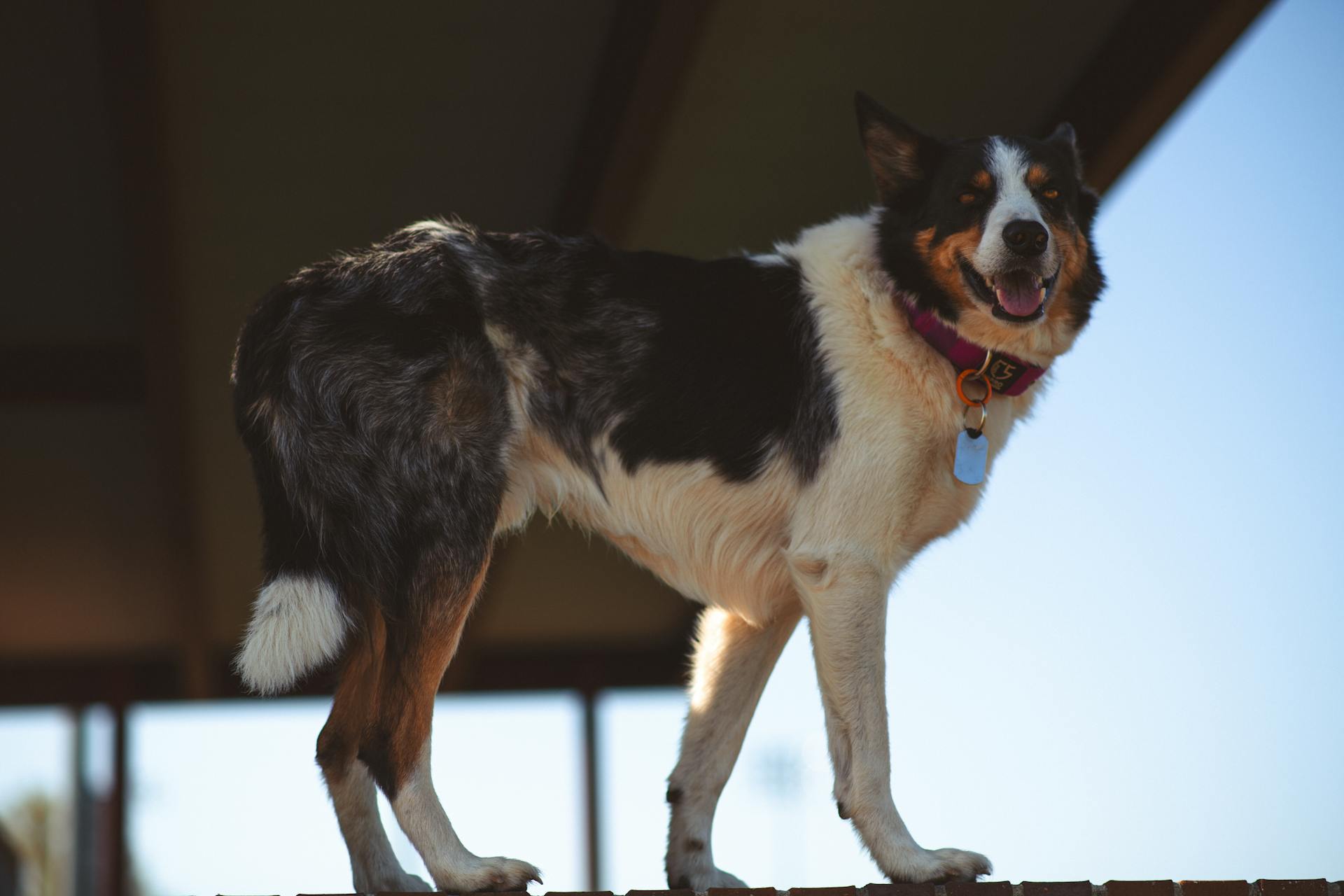
They can be prone to health conditions or diseases passed down from their parent breeds, including Sebaceous Adenitis, Cataracts, and Progressive Retinal Atrophy. Regular veterinary check-ups can help detect these issues early on.
Here are some common health issues that mini Aussiedoodles may face:
- Sebaceous Adenitis
- Cataracts
- Progressive Retinal Atrophy
- Hip Dysplasia
- Cushing’s Disease
- Pancreatitis
- Epilepsy
- Multiple Drug Sensitivity
A healthy diet, regular exercise, and regular veterinary check-ups can help minimize the likelihood of these health issues.
Health Issues
Aussiedoodles are generally healthy dogs, but like any breed, they can be prone to certain health issues. Their lifespan is between 10 and 14 years.
Regular veterinary check-ups are crucial for managing the progression of PRA, a degenerative eye disorder that leads to vision loss. This genetic condition can affect various dog breeds, causing night blindness initially and progressing to complete blindness.
Hip dysplasia is a genetic condition where the hip joint doesn’t develop properly, leading to malformation and instability. This can result in arthritis, pain, and difficulty in movement for affected individuals.
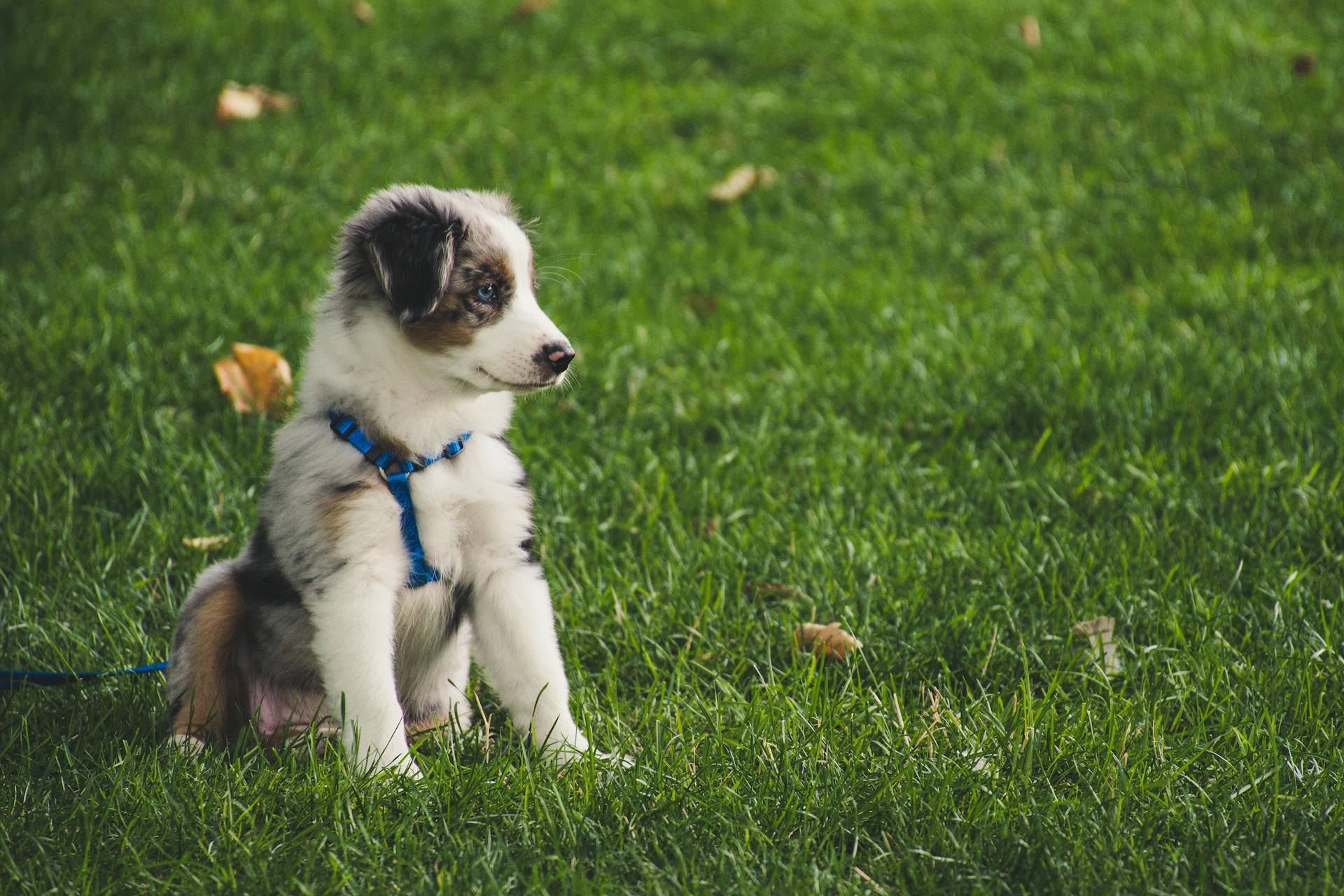
Cataracts involve the clouding of the eye’s lens, leading to impaired vision or blindness if left untreated. While age-related cataracts are common in dogs, some breeds are genetically predisposed to developing them earlier in life.
Aussiedoodles can also be prone to allergies, especially food allergies and environmental allergies. Regular flea and tick prevention is essential to prevent flea allergy dermatitis.
Here are some common health issues that Aussiedoodles may face:
- Hip dysplasia
- Progressive retinal atrophy (PRA)
- Cataracts
- Thyroid disease
- Epilepsy
- Bloat
- Ivermectin sensitivity
- Multiple drug sensitivity
Proper weight management and regular exercise can help prevent hip dysplasia, but it can also be an inherited condition.
Do Aussies Shed?
They shed a fair amount, though not nearly as bad as other breeds.
Their shedding sits somewhere in the middle of the canine world, and how bad they shed will vary from dog to dog.
For those with allergies, the good news is that Aussiedoodles can sometimes be hypoallergenic.
However, never assume an Aussiedoodle is hypoallergenic without checking with a reputable breeder first.
You may be unpleasantly surprised if you don't do your research, as Aussiedoodles are an expensive breed.
Broaden your view: Hungarian Dog Kuvasz
How Long Do They Live?
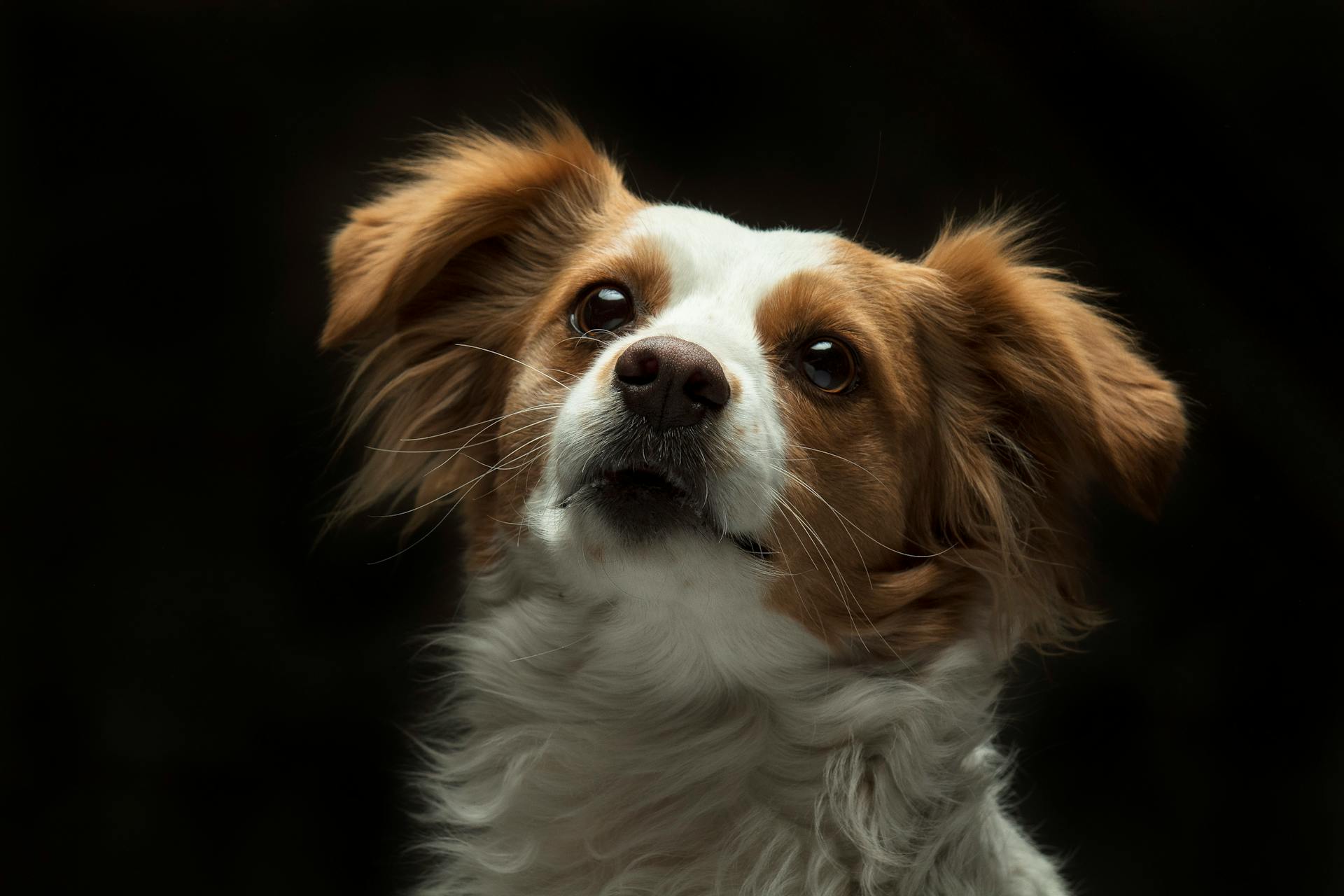
The aussiedoodle's lifespan is a significant factor to consider when bringing one of these lovable dogs home. Their average lifespan is around 10 – 14 years.
Their life expectancy does depend on their height and weight, which is interesting to note.
Intriguing read: Mini Sheepadoodle Lifespan
Heterochromia
Heterochromia is a condition where one eye is colored differently than the other, and it's more common in certain breeds, such as the Australian Shepherd. This breed is one of a few that commonly have two different-colored eyes.
Mini Aussiedoodles can inherit this trait, resulting in a combination of brown, blue, hazel, amber, or green eyes. Interestingly, they can even display more than one color in the same eye.
Training and Behavior
Mini Aussiedoodles are highly intelligent dogs that thrive on mental stimulation. They love to play and have a task to accomplish, making clicker training a great option.
Their sharp minds make training relatively easy, but they do require consistent effort and positive reinforcement. Aussiedoodles are quick to learn and can master basic cues, such as "stay" and "come", with practice.
Related reading: How to Train an Aussiedoodle
Aussiedoodles have a strong herding instinct, which can lead to destructive behaviors like chewing or digging if they're not kept busy. They need regular exercise and mental stimulation to prevent boredom and restlessness.
If you're considering a mini Aussiedoodle as a pet, be prepared to spend time outside and engage in regular walks and playtime. Their energy levels are high, and they'll need daily exercise to stay happy and healthy.
Can Dogs Get Along with Other Animals?
Dogs can get along with other animals, but it's essential to introduce them at an early age and under controlled circumstances.
Aussiedoodles, for instance, tend to get along with most pets they meet as long as the interaction is favorable.
However, it's crucial to bring them into a house with more diminutive pets with a firm, gentle hand to prevent any potential conflicts.
If you own a cat, parakeet, or exotic lizard, try to get the dog to meet it in a monitored environment where both can get to know each other.
Aussiedoodles are a good choice for people with various animals, but they still need to be observed until the two grow comfortable around each other.
Behavior and Training
Aussiedoodles are highly intelligent dogs that thrive on mental stimulation, so be prepared to engage their sharp minds with activities like clicker training and teaching them to learn tricks.
Their strong herding instincts and urge to chase can put them in danger, so teaching basic cues like "stay" and "come when called" is vital.
Aussiedoodles love to play and have a task to accomplish, which makes them well-suited for activities like long hikes, walks, and retrieval games.
If you don't provide enough mental stimulation, they might turn to destructive behaviors like chewing or digging.
Aussiedoodles are happy to show you how capable they are, and with proper training, they can learn to be quiet on command.
They may bark to alert you or inform the homeowner that someone is at the door, but they're unlikely to let the neighbors know the sidewalk is off-limits.
You'll need to keep them on a leash or inside a fenced-in area when they're outside, as their hunting and herding instincts can lead them to chase after neighborhood animals or even cars.
Aussiedoodles are social dogs that love to be around their humans, but they can sometimes form strong bonds with one or two favorite people.
Fun and Activities
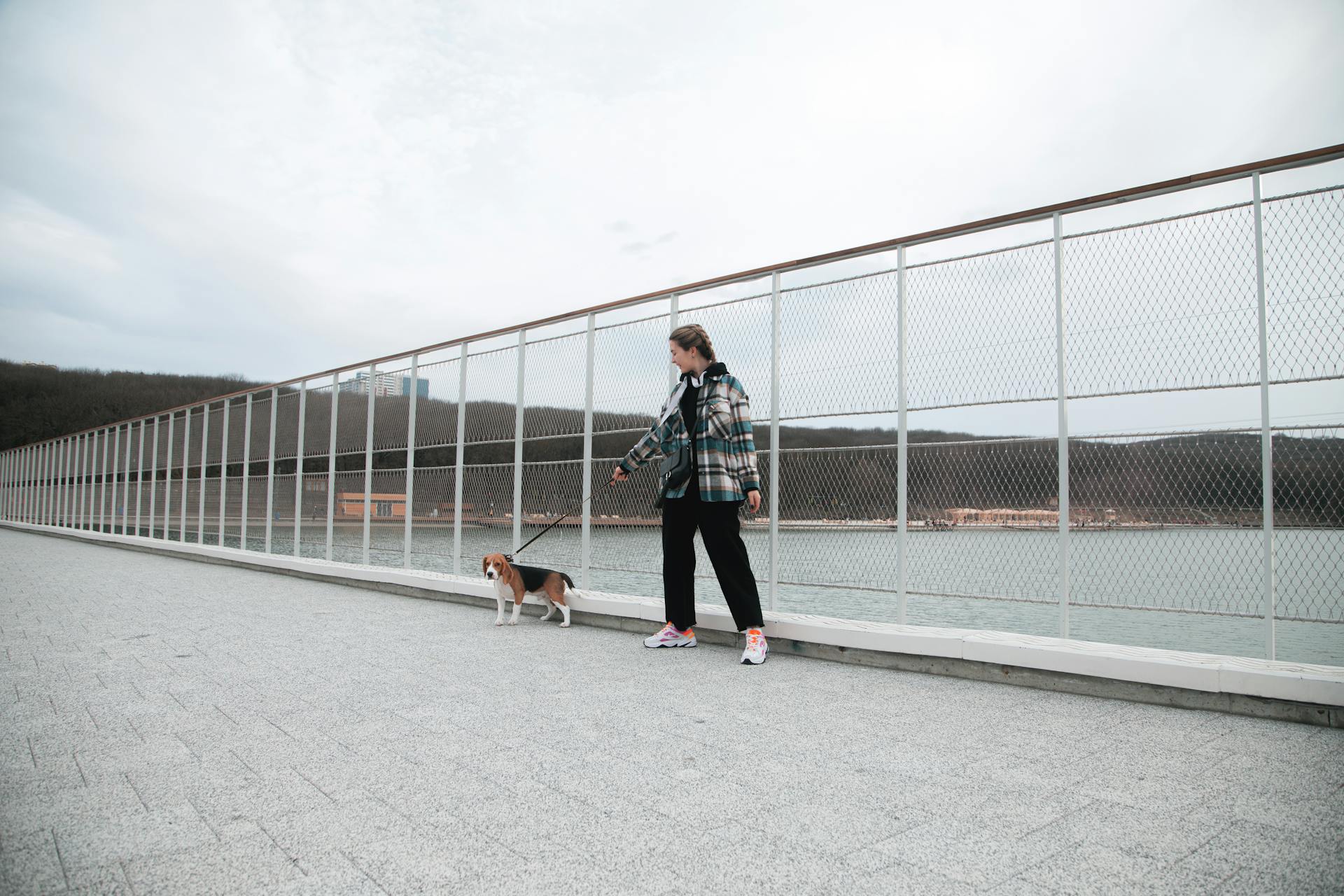
Mini Aussiedoodles are full of energy and need regular exercise to stay happy and healthy. They require at least an hour of daily exercise to keep them mentally and physically stimulated.
Here are some fun activities you can try with your Mini Aussiedoodle:
- Agility courses
- Lure chasing
- Hunting and retrieving
- Therapy work
- Dock jumping
- Swimming
With their high energy levels, it's essential to find activities that challenge them physically and mentally. Mini Aussiedoodles love to be around their humans and will often stick with one or two favorite people, making them great companions for families.
Fun Activities for Aussies
Aussies are an energetic bunch, and they need plenty of fun activities to keep them happy and healthy. They thrive on physical and mental stimulation, so let's get started!
Agility courses are a great way to challenge your Aussie's body and mind. They'll love navigating tunnels, jumping over obstacles, and running through mazes.
Lure chasing is another favorite activity for Aussies. With a little creativity, you can set up a course using treats or toys to keep your Aussie engaged and active.
Curious to learn more? Check out: American Shepard Dog
Hunting and retrieving are natural behaviors for Aussies, and they'll love the thrill of the chase. Whether it's a ball or a toy, they'll be happy to bring it back to you.
Therapy work is also a great option for Aussies. With their friendly and outgoing personalities, they make perfect therapy dogs.
Here are some fun activities to consider:
- Agility courses
- Lure chasing
- Hunting and retrieving
- Therapy work
- Dock jumping
- Swimming
Remember, Aussies need regular exercise to stay happy and healthy. Aim for at least an hour of physical activity per day, and make sure to include a mix of physical and mental stimulation.
Fun Facts
You'll love these fun facts about Aussiedoodles! They're such a unique and lovable breed.
Their nickname game is strong - you can also call them Aussiepoo, Australian Shepherd Poodle, or Aussiepoodle. It's no wonder they have a popular Instagram page, Aussiedoodles Daily, showcasing their amazing range of colors, faces, and personalities.
Did you know that the Australian Shepherd breed got its name from a mix-up when they immigrated to the US with ranchers? It's a funny story, but it's led to the creation of this incredible hybrid breed.
Here are some of the most common sizes of Aussiedoodles:
- Toy Aussiedoodles
- Miniature Aussiedoodles
- Standard Aussiedoodles
Frequently Asked Questions
How big will mini aussiedoodles get?
Mini Aussiedoodles typically grow to 12-18 inches tall and weigh 15-35 pounds, but can be smaller if bred with a Miniature Poodle. Their size can vary, making them a unique and lovable companion.
Do mini Aussiedoodles shed a lot?
Mini Aussiedoodles tend to shed minimally, making them a low-maintenance option for those with allergies or a preference for less dog hair. However, regular grooming is still necessary to keep their coat looking its best.
Do mini aussiedoodles bark a lot?
Mini Aussiedoodles tend to bark moderately, not excessively, but they will vocalize when alert, excited, or anxious. Their barking needs can be managed with proper training and socialization.
Are mini aussiedoodles hyper?
Yes, mini Aussiedoodles are known to be energetic and playful, requiring regular exercise and mental stimulation. If you're looking for a lively companion, a mini Aussiedoodle might be a great fit.
What does a full grown mini Aussiedoodle look like?
A full-grown mini Aussiedoodle typically stands 12-19 inches tall and weighs 15-40 pounds, with a sturdy yet playful build.
Featured Images: pexels.com

